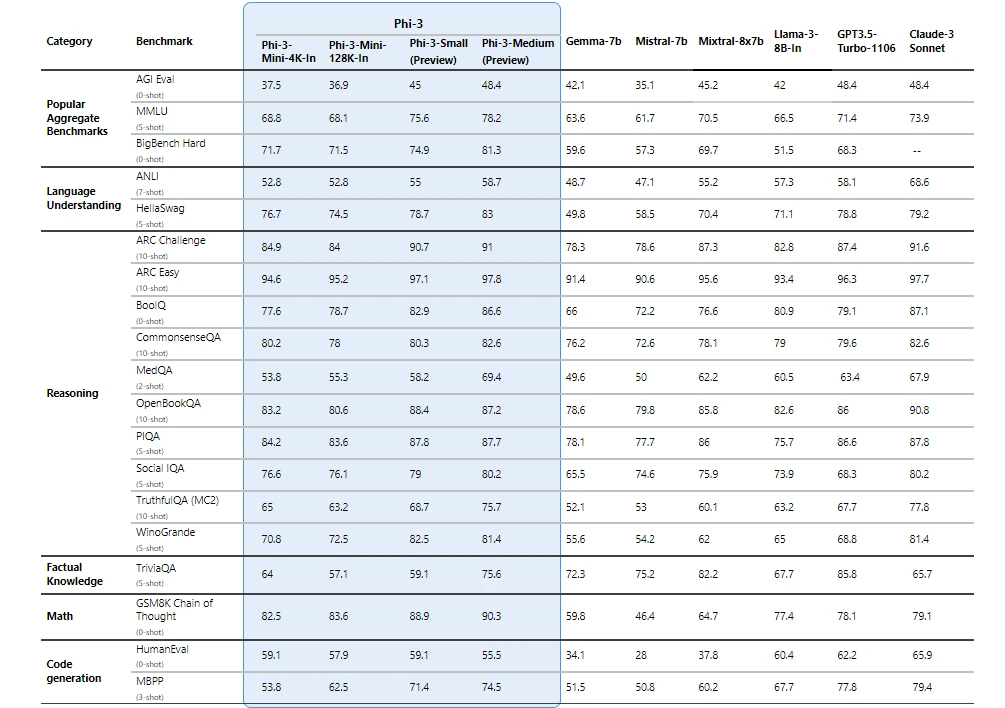Last Updated on April 25, 2024 1:24 pm by Laszlo Szabo / NowadAIs | Published on April 25, 2024 by Laszlo Szabo / NowadAIs
Microsoft Phi-3: The Smallest AI to Fit Personal Devices? – Key Notes
- Introduction of Microsoft Phi-3 as a significant development in AI technology.
- Designed to operate efficiently within small-scale AI model parameters.
- Targets enhancements in AI accessibility and integration in various devices.
- Focuses on optimizing performance while maintaining lower resource usage.
- Potential applications in mobile devices, IoT, and edge computing.
Introduction
Microsoft, as key player in the ever-evolving landscape of Artificial Intelligence, constantly pushing boundaries and introducing innovative solutions. One such breakthrough is the launch of Microsoft Phi-3, the smallest AI model yet. With its compact size and impressive capabilities, Phi-3 is set to update the whole field of AI.
Now we will explore the features, applications, and advantages of Microsoft Phi-3, along with its impact on various industries.
Understanding Microsoft Phi-3
Phi-3 is the latest addition to Microsoft’s AI model lineup. This lightweight model boasts 3.8 billion parameters, making it smaller than its predecessors. Despite its size, Phi-3 is trained on a specialized dataset that enables it to deliver exceptional performance. This revolutionary model is available on Azure, Hugging Face, and Ollama, ensuring accessibility for developers and businesses alike – it’s research paper available as well.
The Power of Parameters
Parameters play a crucial role in determining the capabilities of an AI model. In the case of Phi-3, its 3.8 billion parameters allow it to comprehend complex instructions and deliver intelligent responses. Microsoft has meticulously designed Phi-3 to strike a balance between size and functionality. Although smaller than larger language models like GPT-4, Phi-3 performs remarkably well, providing responses comparable to models ten times its size.
Advantages of Small AI Models
Small AI models, like Microsoft Phi-3, offer several advantages over their larger counterparts. Firstly, they are more cost-effective to run, making them an attractive choice for businesses with limited resources. Additionally, these models excel in personalized devices such as smartphones and laptops, delivering efficient performance without compromising on quality. Microsoft recognized the potential of smaller models, leading to the development of Phi-3 to cater to various application scenarios.
Phi-3 Mini and Beyond

Microsoft Phi-3 is just the beginning of a series of small models the company plans to release. Phi-3 Mini, with 3.8 billion parameters, is just the tip of the iceberg. Microsoft has ambitious plans for Phi-3 Small (7B parameters) and Phi-3 Medium (14B parameters). These models will further expand the capabilities of the Phi-3 series, offering developers and businesses a range of options to suit their specific needs.
Phi-3’s Learning Journey
Phi-3’s development was inspired by the concept of learning from bedtime stories, much like how children grasp knowledge through simplified language and structure. The Phi-3 family of models builds upon the lessons learned from previous iterations. While Phi-1 focused on coding and Phi-2 emphasized reasoning, Phi-3 excels in both coding and reasoning tasks. However, it is important to note that Phi-3’s expertise lies in specific domains, and it may not match the breadth of knowledge possessed by larger models trained on vast amounts of data.
Applications of Microsoft Phi-3
The applications of Microsoft Phi-3 are vast and diverse. Its compact size and efficient performance make it ideal for a wide range of industries. For businesses dealing with smaller datasets, Phi-3 offers tailored solutions that are cost-effective and highly efficient. Phi-3 can be harnessed for tasks such as document summarization, coding assistance, chatbots, and language-related work. Its versatility and adaptability make it a valuable asset in various sectors, including finance, healthcare, and technology.
Competitors in the Small AI Model Space
Microsoft is not alone in the pursuit of small AI models. Competitors such as Google and Anthropic have also ventured into this domain. Google’s Gemma models are designed for simpler tasks like chatbots and language-related work, while Anthropic’s Claude 3 Haiku excels in reading research papers and generating summaries. Each competitor brings its own unique strengths and use cases to the table. However, Microsoft Phi-3 stands out with its focus on compact size and efficient performance.
Impact on Industries
The introduction of Microsoft Phi-3 is poised to have a significant impact on various industries. In the finance sector, Phi-3’s cost-effectiveness and performance make it an ideal choice for data analysis and risk assessment. In healthcare, Phi-3 can assist in medical research, patient diagnosis, and drug discovery. The technology sector can leverage Phi-3 for application development, coding assistance, and natural language processing. With its versatility and adaptability, Phi-3 has the potential to revolutionize numerous industries.
The Future of Microsoft Phi-3
Microsoft Phi-3 represents a promising step towards the future of AI. As Microsoft continues to refine and expand its Phi-3 series, the possibilities for innovation and advancement are endless. The company’s commitment to developing smaller, more efficient AI models demonstrates its dedication to providing accessible and powerful solutions for developers and businesses worldwide. With Phi-3 leading the way, Microsoft is shaping the future of AI technology.
Definitions
- Microsoft: A global technology leader known for its software, services, and solutions that help people and businesses realize their full potential.
- Phi-3: Microsoft’s newly developed AI model focused on optimizing AI performance in small-scale applications, balancing efficiency and computational power.
- Small AI Models: Compact artificial intelligence systems designed to require less computational power and storage, suitable for applications in devices with limited processing capabilities or where minimizing power consumption is crucial.
Frequently Asked Questions
- What is Microsoft Phi-3 designed to achieve in the AI landscape? Microsoft Phi-3 is designed to bridge the gap between high-efficiency and high-performance in AI applications. It allows for robust AI functionality in devices with limited computational resources, making advanced AI more accessible and widespread.
- How does Microsoft Phi-3 differ from other AI models currently available? Unlike larger AI models that require significant computational resources, Phi-3 is optimized for smaller scales, ensuring that it delivers effective performance without the extensive power and data demands typically associated with advanced AI systems.
- What are the potential applications for Microsoft Phi-3? Phi-3 can be integrated into a variety of platforms, particularly in mobile devices, IoT devices, and edge computing scenarios, where managing power efficiency and processing capabilities is crucial.
- Can Microsoft Phi-3 improve AI usability in everyday tech devices? Absolutely, Phi-3’s design focuses on bringing AI capabilities to everyday devices without the high resource costs, enhancing user experiences in technology from smartphones to home automation systems.









